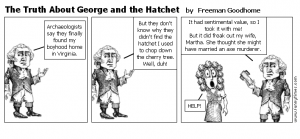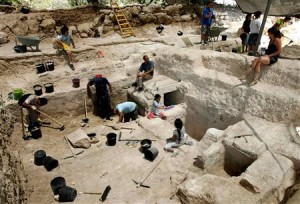Archaeology is not about finding an object. It is not about an object at all. Archaeology is about finding the story behind the object, the history of the person who made it, owned it, or took care of it. The artifacts mean nothing if there is no context. Without this context, you would not understand the past or the lives of the people throughout history.
If you were trying to find out about a culture, a tribe, a family or a single individual, where would you look? Do not look in the most obvious places, where you know you are guaranteed to find something, or you know what it is you will find. Look places that you would never have though of looking, or where maybe the treasure isn’t (if there is any) because the real treasure is finding something that tells you about the person or people that you would have never know before, something about their “secret lives”. This could be anything, what they did when they are not being watched by the authorities, or by their neighbors. A hobby, a skill, or a lover can be discovered. A stereotype can be broken. Something about a culture could be found, that you never thought could be possible.
When a person or a tribe moves a place, they don’t leave what is important to them, they leave what they think they don’t need, that they can survive without, that they find unimportant. But this is just as useful in discovering the past, because by knowing what they didn’t need, we find out just as much about them then knowing what they brought with them. Looking in doorways, where people drop items out of their bags or pockets, or trashcans and dump sites, can be just as important as looking in a temple or a grave. Both in modern and ancient times, surveying or excavating a place where people might leave things behind, discard items, or not be in the public view, you get a sneak peak into the real, unfiltered life of someone.

why would he leave something so important behind?
I think this is what I have really taken away from my learning and increased knowledge about archaeology. That it is the little things that count, the artifacts that tell you something about someone that maybe they didn’t want to be known, or finding something that breaks assumptions, changes stereotypes, changes peoples opinions about a culture. I think from now on I will see archaeology as a way to find things about the past, so we can better help the present and future. Archaeology is finding artifacts that explain a different outlook than the written records, providing a deeper insight into the public’s perception of what happened. With archaeology you can reevaluate history and change peoples perspectives.
Laila Blumenthal-Rothchild
Picture links:
http://www.funnytimes.com/playground/img/121506559366011.png
http://www.topnews.in/files/Archaeological.jpg


It’s definitely true that artifacts can reveal more about people than they maybe consciously realize; as you noted, sometimes what people discard can reveal as much about their lifestyle as something they cared for and held on to. While trash is, for most of us, an afterthought, some archaeologists dedicate their academic careers to its study – a new archaeological subfield called “garbology.” Edward Humes, in his book Garbology: Our Dirty Love Affair with Trash, argues that our garbage reveals much about who we are, how we live, what we value – and what we don’t value. Thus, the study of garbology does not only have to be about an individual’s lifestyle but can (and should) be a critical look at our society’s consumption habits in general. If, as Humes notes, the average American produces 102 tons of garbage throughout his or her lifetime, what does that say about us as a culture?